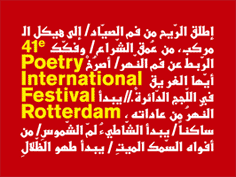Monday 14th June
Today was a great day in Rotterdam; and not only for poetry. Right now I can hear cars hooting, youngsters cheering and a general air of celebration. It is a joy to be away from my depressed island in the North Atlantic, to be here in a land that can celebrate. The Netherlands is happy right now: it has won a vital match against Denmark in the World Cup. Today, even the poets are happy: those poets, that is, who follow the demotic life of football as well as the heavenly vocation of poetry.
All day I’ve wandered around the complex and perfectly beautiful foyers of Rotterdam’s City Theatre, the home of Poetry International 2010. We poets, a happy few, are contented with the day’s work. We have also scored a series of little victories in the first round of our Translation challenge. We’ve succeeded in translating three of the poems of Tomas Lieske. Admittedly, we’ve been spoon-fed with brilliant literal translations. All morning we circled around the Present Continuous verb “Ontdekken’’ as in “Ontdekken Dat Je Te Laat Bent” or “Discover (Discovering) That You Are Too Late”—or the title “Kompel” that may mean “Cobbler” or “Coal-miner” depending on whether you are digging into the linguistic heritage of Southern Ireland or Southern Holland. Tomorrow we must work on the texts again. One of my fellow translators, the poet Patrick Cotter, is running well ahead of the pack, but we will catch up with him before the week is out.
It is a day of hidden foyers. Sometimes you come upon a foyer with books, or a foyer with food, or a foyer with a busy bank of Festival interns, all beavering away, answering phones, checking checklists. It is a world of hidden efficiencies, of quiet Dutch perfections. Around the table next to us, in our large hidden foyer, is a group of poets at work on the texts of the sublime Carlos Lopez Degregori of Peru. I remember the first time I saw his poems on the Poetry International web. I was bowled over by their reticence, their humane quality, their astonishing sensitivity. These texts alone prove that translation can work. Some quality of the poetry does survive the translation. We will continue at our dissecting tables: word-surgeons at work, saving organs of phrases and adjectives for a foreign body of words.
Last night was a night of prose-poetry, of poetry and prose, of poetry with its hyphenated life. Hassan El Ouazzani and I read our poetry to a fine audience in the main auditorium of the City Theatre. Ireland’s Ambassador to the Netherlands, Mary Whelan, along with her husband, and the Embassy Attaché in the Hague came down to hear us read. Afterwards we had a mighty chat about politics and culture. Among the Irish in the audience, also, was Lucy Cotter, daughter of the lately deceased poet, Bonnie Quinn Cotter. It was lovely to see her. For an Irish poet it was a personal moment.
We have oscillated between poetry and prose. We have been to the precarious ledge of prose-poetry, Hassan and I; we have been to the edge and not toppled over. Prose-poetry is for outlaws, for outsiders, for those who have endured extremes of politics and culture. Prose-poetry describes a hinterland of being. It began with the French, of course, with Bertrand and Baudelaire, and continued with Rimbaud. But even in the Irish tradition, which is so overwhelmed with songs and lyrics, prose-poetry breaks through in James Joyce and Beckett. It is all of Finnegan’s Wake and a good part of Ulysses. It is everywhere in Beckett, in Molloy, Watt, Waiting for Godot. Godot, a poetry of theatre, with its gestures, silences, timing, choreography, with its worn-down and weary opinion, is prose-poetry. After all, it is Vladimir who turns to Estragon and says, ‘you should have been a poet.’
Prose-poetry is now strongest in the American language, I think. I think (it is nearly midnight and I am doing my best). Prose-poetry is action through reflection. Competent Americans like John Ashbery and Charles Simić have turned it into a kind of guerrilla warfare against anthologies and canons. Prose-poetry invites you in. You don’t need a dinner-jacket. Come right it as you are. It is a summer night. It is Rotterdam.

